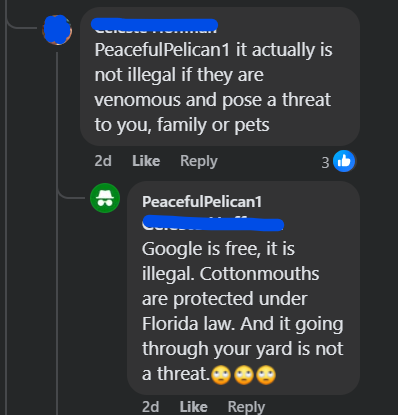Is It Illegal to Kill Cottonmouths in Florida? Local Residents Debate After Viral Post
A Palm Coast resident posted a photo of a cottonmouth snake they killed on their property, sparking a flurry of online comments. Many users questioned whether killing the venomous snake is against the law. We investigated what Florida law says about handling cottonmouths and other venomous snakes.

A simple post on social media has sparked a heated debate among Palm Coast residents: Is it legal to kill a cottonmouth snake?
Last week, a local resident shared a photo of a cottonmouth, also known as a water moccasin, they killed on their property. The post quickly went viral, drawing hundreds of comments—some congratulating the homeowner, others warning that it’s illegal to kill the venomous snake.

According to the Florida Fish and Wildlife Conservation Commission (FWC), cottonmouths are native venomous snakes, and it is generally legal for homeowners to kill them if they pose a threat on private property. This rule applies to other native venomous snakes, including rattlesnakes and coral snakes.
However, FWC officials caution that killing snakes should be a last resort. They recommend avoiding interactions whenever possible and contacting professional wildlife removal services for safe removal. Improper handling of venomous snakes can result in serious injury.
It’s also important to note that while killing native snakes is legal under certain circumstances, the release, sale, or possession of non-native venomous snakes is illegal in Florida and can carry significant penalties.
For residents concerned about cottonmouths, FWC advises keeping yards clear of debris and maintaining a safe distance from water edges where cottonmouths often reside. The agency emphasizes education and caution over confrontation.
As the debate continues online, this incident highlights a mix of public fear, fascination, and confusion surrounding Florida’s native wildlife—and the fine line between legal action and safe, responsible wildlife management.
Sources:
- Florida Fish and Wildlife Conservation Commission – Snakes
- WUSF News – Florida venomous reptile laws
Author
Sign up for Palm Coast Daily newsletters.
Stay up to date with curated collection of our top stories.


